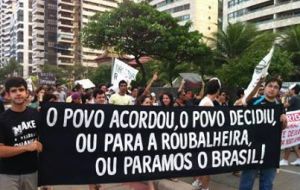MercoPress. South Atlantic News Agency
Sao Paulo and Rio roll back bus fares but protests keep spreading to other cities
 “The people have woken” seems to the protestors’ slogan.
“The people have woken” seems to the protestors’ slogan. Brazil's two biggest cities agreed to revoke an increase in public transportation fares that set off demonstrations that have grown into nationwide protests against poor public services, inflation, corruption and lavish spending in stadiums to host global events.
The decisions, made separately in Sao Paulo and Rio de Janeiro, followed another day of protests across Brazil, which also included a march by demonstrators around a major international soccer game in the north eastern city of Fortaleza.
This month's transport fare hikes, which came as Brazil struggles with annual inflation of 6.5%, stirred a groundswell of other complaints, leading to the biggest protests to sweep Brazil in more than two decades. The protests have been organized by a disparate group of activists who have rallied supporters via social media.
Sao Paulo state Governor Geraldo Alckmin, announcing a reduction in fares to their level before the hike, called it “important ... so the city can have the tranquillity needed to debate issues calmly.”
It remains unclear whether revoking the fare increases, which followed similar fare cuts in other state capitals, will be enough to quell the unrest. Initially focused in cities like Sao Paulo, Rio and Brasilia, demonstrations have spread, with protests planned in more than 70 smaller cities for Thursday.
After the fare increase was scrapped, leaders of the protest movement in Sao Paulo said their cause would now shift to free public transport and that a planned protest for Thursday would be a celebration.
President Dilma Rousseff acknowledged on Tuesday the legitimacy of the protesters' demands. Her Workers' Party presided over a near decade-long economic boom that lifted more than 30 million people from poverty. But a recent slowdown is prompting many among Brazil's growing middle class to demand more of the government.
She praised the mostly non-violent demonstrators and said her government would seek to improve schools, hospitals, infrastructure and other public facilities and services.
To help maintain order, Rousseff dispatched federal troops to five cities hosting games during the Confederations Cup, an international soccer tournament that began earlier this month. The competition is a warm-up for the 2014 World Cup, a much bigger tournament that Brazil will also host.
The deployment, part of the contingency plan for the Confederations Cup, is similar to the previous use of federal troops when crime, violence or other unrest disrupted annual Carnival celebrations and other big events.
Contrasting the country's high taxes with its ramshackle schools, hospitals and other shabby government services, demonstrators have criticized the 28 billion Reais (12.9bn dollars) of public money being spent on the World Cup, to be played in 12 Brazilian cities.
In Sao Paulo, the site of the most frequent marches until now, protests further complicated the daily commute for many of the residents of Brazil's financial and industrial hub. Demonstrations have so disrupted the already gridlocked city that many companies have allowed employees to leave early in recent days or allowed them to work from home.
Wednesday's marches followed overnight demonstrations in the city that led to looting and vandalism. Police arrested more than 63 people after protesters torched a police facility, tried to storm City Hall and broke windows and ransacked stores.
So far, neither Rousseff's bid to embrace the protests nor previous transport fare reductions in other cities have done much to stop the unrest, in part because of the diffuse nature of the protesters and the wide array of demands.
“It's difficult to get ahead of the movement because there isn't a clear image of who they are or what exactly they will do,” said David Fleischer, a political scientist at the University of Brasilia. “It's hard to have a discourse with someone you don't know.”





Top Comments
Disclaimer & comment rules-

-

-

Read all commentsSorry, Dilma, that won't do the job. People are protesting widepsread corruption. People demand the lazy civil servants and politicians to make their high salaries and legal protections worth and change drastically the public administration - which also means ending high salaries and legal protections.
Jun 20th, 2013 - 04:38 am 0“The people have awoken and decided ... stop the corruption or we will close down Brasil!”
Jun 20th, 2013 - 01:12 pm 0I really hope it is *the People* that have awoken, and not just the Sociology students from USP.
Even the Summer of Love fizzled out when the Summer ended, and students have short spans of focus.
Victor Hugo observed the 1832 (student) rebellion and wrote it into the unmatchable Les Miserables. The population of Paris closed their shutters on students dying for them, under the gun in their street protest, behind their barracades.
It is true that the left is tring its best to have the monopoly of the protest, but the majority of people boo party flags and want better management. Backfired.
Jun 20th, 2013 - 07:01 pm 0Commenting for this story is now closed.
If you have a Facebook account, become a fan and comment on our Facebook Page!